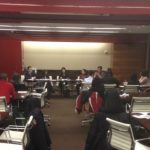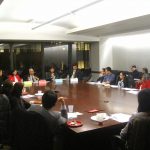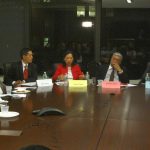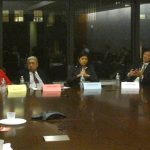PRESS RELEASE
NEW YORK – January 27, 2014 – The Asian American Bar Association of New York (“AABANY”) is proud to announce that it will receive a 2013 Bar Leaders Innovation Award for its Asian Pacific American Heritage Month production, “Iva: The Myth of Tokyo Rose.” The award bestowed by the New York State Conference of Bar Leaders Executive Council of the New York State Bar Association recognizes bar associations that introduce new programs, ideas and methodologies that benefit its members and the community at large. AABANY’s “Tokyo Rose” program was evaluated based on its ingenuity and creativity, effect on the bar and general public, and its overall quality.
“Iva: The Myth of Tokyo Rose,” which was co-produced by AABANY and the Asian American Arts Alliance (the “Alliance”), tells the story of Iva Toguri, a Japanese American citizen, who was accused of treason during World War II. Original court transcripts were edited and compiled under the leadership of the Honorable Denny Chin and Kathy Hirata Chin. This material was then adapted by playwright Soriya Chum and culminated in a production addressing issues concerning race, civil rights, prosecutorial abuse and social injustice. “Tokyo Rose” was directed by Soriya Chum and Elena Chang and performed on stage at the Asia Society in New York City on May 16-17, 2013. Following the performances, talkbacks were held with esteemed speakers and guests, including the Honorable Denny Chin (U.S. Court of Appeals, Second Circuit), Kathy Hirata Chin (Cadwalader, Wickersham & Taft LLP), Gurjot Kaur (Sikh Coalition), Andrea Louie (the Alliance), Yang Chen (AABANY), Rehana Mirza (Ma-Yi Theater’s Writer’s Lab) and Eileen Rivera (Leviathan Lab).
The New York State Conference of Bar Leaders will honor AABANY along with its sister bar associations for their innovative programs at the Annual Breakfast for Bar Leaders to be held at the Hilton New York Midtown on Friday, January 31, 2014. “On behalf of AABANY, we thank the New York State Conference of Bar Leaders for this prestigious award and recognizing our continuing efforts to produce programs that address significant legal issues and social matters of importance to our members and the Asian Pacific American community as a whole,” said Mike Huang, AABANY’s President.
###
The Asian American Bar Association of New York was formed in 1989 as a not-for-profit corporation to represent the interests of New York Asian American attorneys, judges, law professors, legal professionals, paralegals and law students. The mission of AABANY is to improve the study and practice of law, and the fair administration of justice for all by ensuring the meaningful participation of Asian Americans in the legal profession.
A performance review of “Iva: The Myth of Tokyo Rose,” is available at http://blog.asianinny.com/films/iva-the-myth-of-tokyo-rose/













